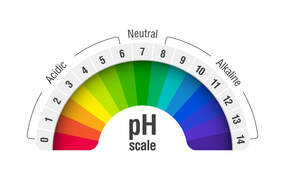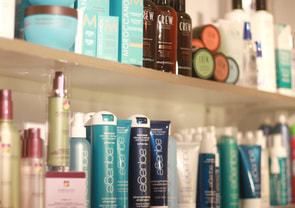Are Salon Products Really Worth The Cost?
|
The choice between professional or drugstore hair products can be a tough one. When you can find liter-sized shampoos at Target, why does your hairstylist recommend an 8-ounce bottle that costs twice as much? Is there really a difference? Are salon products really worth the price? Or is your stylist just trying to make an extra commission?
|
Fortunately, many researchers are asking the same questions. And lucky for us, they’ve found some answers!
|
A study published in the Internal Journal of Trichology compared the pH levels of 123 different shampoos and the relative impact on hair health. For anyone who hasn’t had a chemistry lesson in a while, here’s a quick refresher: Potential of Hydrogen, or pH, is the measurement of how acidic or alkaline a substance is. The scale ranges between 0 and 14, with anything between 0 and 6.9 being acidic, and anything between 7.1 and 14 being alkaline. 7 is neutral.
|
Healthy human hair has a pH balance between 4 and 5. This natural acidity prevents fungi and bacteria from forming on your scalp, and keeps your hair cuticle closed and strong.
The study concluded “It is a reality and not a myth that lower pH of shampoos may cause less frizzing for generating less negative static electricity on the fiber surface.” The researchers stated the importance of revealing the pH value on shampoo labels after discovering only 38% of the popular store-brand shampoos presented a pH ≤ 5.0, compared to 75% of salon shampoos.
|
Another study compared product formulas. Often, consumers are led to believe a single ingredient can transform their hair - biotin, keratin, collagen, the list goes on. The “magic ingredient” strategy is used by companies to present their products as being miraculously and exceptionally effective. But the study determined it’s actually the interaction between product ingredients that is more important than one ingredient alone.
|
While some drugstore store products may contain similar ingredients to those found in salon products, they are usually much smaller quantities and heavily diluted with water or fillers. Celebrity stylist Oscar Blandi told INSIDER "Often, drugstore products will shrink the ingredient labels intentionally because they do not want you to read the ingredients” saying “Salon products are simply better for your hair.”
|
But wait, why do you see professional product lines like Blandi in stores then? That’s a good question! In 2011, six years after Oscar Blandi launched his hair care line, beauty investors TPR Holdings LLC announced they had acquired a controlling interest in the company stating “The Oscar Blandi hair care brand has tremendous growth potential which we intend to unlock utilizing strategic brand building, heavy sampling and public relations efforts." Fast forward to 2017 and a lawsuit settlement agreement citing “Failure to comply with Consumer Products Regulation” between 2011 and 2015, noting that Blandi admits the allegations but denies any liability.
|
It’s not uncommon for operators in the consumer products industry to purchase a brand name for mass production. Unfortunately, products are often reformulated to make production less expensive, compromising the quality of the original product.
*Blandi is no longer associated with his eponymous brand being sold in drugstores.
*Blandi is no longer associated with his eponymous brand being sold in drugstores.
Another reason you’ll see professional hair care products on drugstore shelves is diversion. You can read more about diversion here but essentially; diversion is product being sold outside of its authorized chain of distribution potentially putting the quality of the product at risk. Paul Mitchell, for example, has a disclaimer on their website stating that their products are only guaranteed when purchased in a professional salon, not a drugstore or any other unauthorized sources stating "There is also a big operation of fraud, where products are being diluted—or even counterfeit products being sold”.
“But salon products just feel like a luxury I can’t afford.”
Did you also know that many professional hair product companies invest in powering their facilities with solar and wind, use less plastic, use environmentally safe ingredients, and devote efforts to reduce their carbon footprint. Take a look at Kerastase's COMMITMENT TO SUSTAINABILITY.
In addition to considering their impact on the environment, these companies put money back into the salon industry via education, which is absolutely huge for salon professionals. The hair industry thrives and evolves because of the focus on the individuals who sell their product.

Yes, your stylist may make a commission when you purchase a product from their salon. And if you truly feel that the commission is the only reason they’re talking to you about a product, than It May Be Time To See A New Stylist. But more likely, they simply want you to protect your investment and the work they’ve done on your hair. Most stylists are devoted to their art and education, love to share their knowledge, and are honored when you trust their expertise. Plus, many salons offer a money-back or equal-exchange guarantee on products. Your stylist can stand behind their recommendations and you know what you are getting.
Can your local drugstore offer that same level of tailored service?
In the end, you get to decide what works for you, your hair, and your budget. Being an informed consumer will only benefit you so ask questions, pay attention to marketing ploys, and make the choice that’s right for you!






